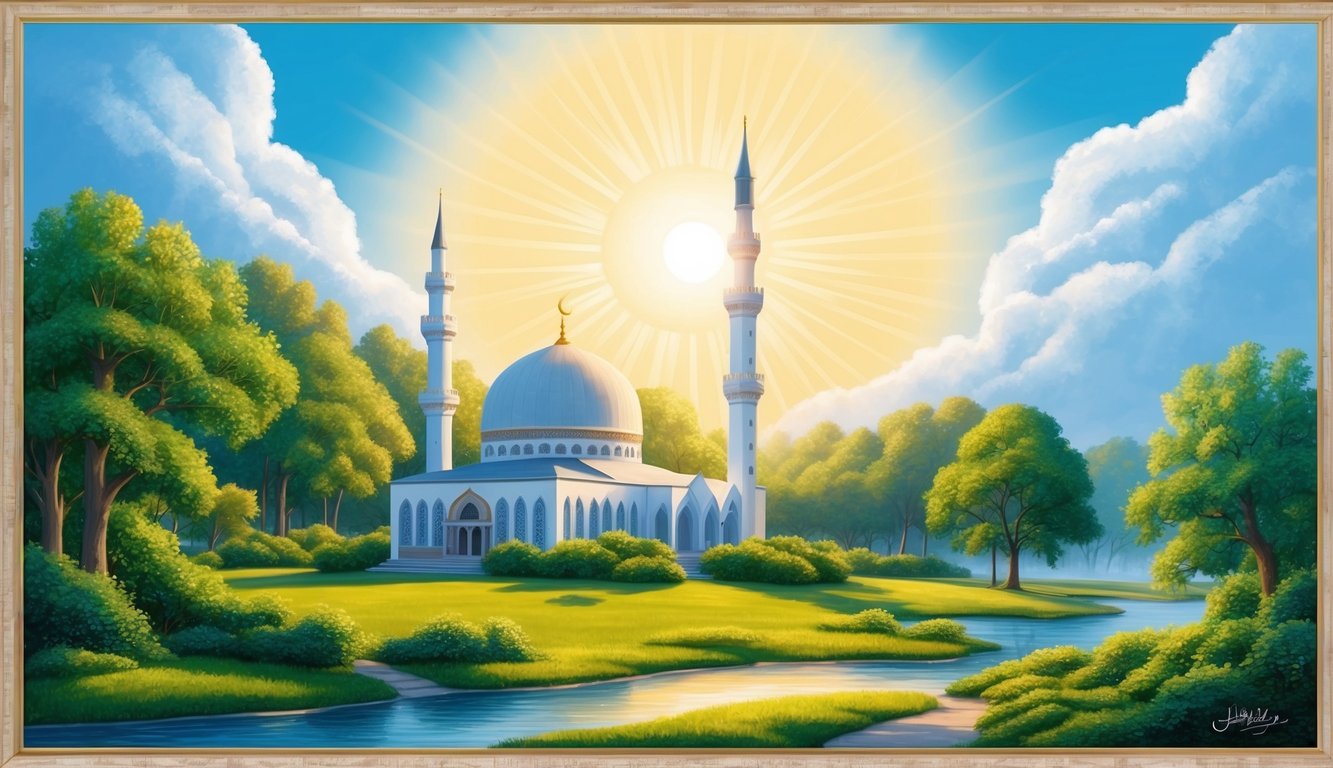Don’t Miss Out On This Unique Astrological Opportunity
Are you tired of spinning your wheels and getting nowhere? Simply put, you’re out of sync: you’re out of alignment with your astral configuration.
But: there’s a kind of map that can help you reclaim your alignment. Think of it as your own personal blueprint to success and happiness: a blueprint that will help you live your most amazing life.
Get started here.
Allah is a central figure in Islam.
In this monotheistic faith, many refer to Him as the supreme being.
As a concept, Allah is much more than just a name.
It represents the unity and singularity of God in Islam, setting the foundation for a Muslim’s way of life.
Muslims turn to the Qur’an, Islam’s holy book, to learn about Allah’s nature and attributes.
The Qur’an emphasizes submission and devotion to a singular divine entity.
This distinguishes Islam from other religions that may have multiple gods or representations.
Understanding Allah involves exploring both historical texts and the broader context of Abrahamic religions.
The word “Allah” is used by millions, not just in Islam, but also in other languages and faiths, including some Christian and Jewish traditions.
Such usage underscores the concept that Allah, as the Arabic term for God, shares roots with similar beliefs in these religious communities, though the interpretations and emphases might vary.
For Muslims, Allah is not a distant deity but one who is intimately connected with the creation and daily life.
He is seen as merciful, compassionate, and just, with a personal relationship with each believer.
This relationship emphasizes submission, highlighting the deep spiritual bond between the worshiper and Allah.
As you continue to explore the role of Allah in Islam, you might find intriguing questions like how Allah relates to other deities in different religions and how the concept of God is perceived across various cultures.
Key Takeaways
- Allah signifies God in Islam and highlights monotheism.
- Other Abrahamic religions also refer to God as Allah in historical contexts.
- In Islam, Allah’s relationship with believers involves submission and devotion.
Concept of Allah in Islam
In Islam, Allah is recognized as the one and only God, embodying attributes like Compassionate and Merciful.
The faith’s monotheistic nature emphasizes His unique characteristics, revealed through the Quran and the traditions of Prophets.
Muslims see Allah as the Creator and Guardian of the universe.
Monotheistic Belief and Tawhid
A key idea in Islam is Tawhid, the belief in the oneness of Allah.
This principle sets Islam apart as a purely monotheistic faith.
Muslims believe that Allah is Omnipotent and Absolute, having complete control over everything in existence.
This belief shapes all aspects of worship and devotion.
Muslims also view Allah as the Eternal and Unique Lord of the Worlds.
This makes Him the focal point of all faith and practice, guiding followers in their daily lives.
Allah’s 99 Names and Attributes
Allah is described by 99 Names, or attributes, known as the Asma’ul Husna, meaning the “Most Beautiful Names.” Each name highlights different aspects of His nature.
Some emphasize His Merciful and Compassionate qualities, like calling Him the “All-Merciful.”
Other names focus on His roles as Creator, Protector, and Wise ruler.
These names offer insights into how Muslims perceive and relate to Allah.
They serve as a reminder of His vast and unlimited qualities.
The Quranic Depiction of Allah
The Quran depicts Allah as a supreme being with numerous attributes, combining Merciful and Just qualities.
He is shown as the Creator and Sustainer of the universe, guiding humanity through Revelations sent to different Prophets.
Through the Arabic language of the Quran, Allah is portrayed as a nurturing and wise deity, inspiring worship and devotion among Muslims.
This includes His role as a benevolent guide and protector.
These teachings form the basis of Islamic theology and are central to the faith’s practice.
Allah in Historical Texts and Comparative Theology
Allah is central to Islam, and recognizing Allah’s presence in historical texts and religious studies offers insight.
By comparing beliefs from different faiths, you can better grasp Allah’s role in Islamic theology and the connections with other Abrahamic religions.
Allah in Pre-Islamic Arabia
In pre-Islamic Arabia, many people practiced polytheism, with multiple deities worshiped in various tribes.
Among these gods, Allah held a special place as a high deity even before the arrival of Islam.
While the worship of many gods was common, Allah was often regarded as the creator or the supreme god.
The Kaaba in Mecca, an important religious site, was believed to honor Allah even during these times.
Gradually, Islam emerged, rejecting polytheism, or shirk, and emphasized worship of Allah as the one and only true God.
You can see how the monotheistic view replaced the complex polytheistic faith prevalent at the time.
References to Allah in Abrahamic Religions
Allah is not just a concept in Islam but is also seen in other Abrahamic religions.
Arabic-speaking Jews and Christians refer to God as Allah, similar to terms like El, Il, Eloh, and Elohim used in Hebrew scriptures.
Judaism and Christianity both have concepts of a singular God.
In the Bible, Allah corresponds to the one true God depicted in scriptures.
Notably, the concept of a sole deity was shared by figures like Abraham and Moses, who are key to all Abrahamic faiths.
Understanding these shared roots helps you appreciate the connections between these religions as the People of the Book.
Concepts of God in Christianity and Judaism
In Christianity and Judaism, God’s nature and characteristics have some differences but also key similarities with the Islamic picture of Allah.
Jews use names like Yahweh to refer to God, emphasizing His oneness and eternal presence.
Christianity, on the other hand, is known for the concept of the Trinity, depicting God as Father, Son, and Holy Spirit.
Despite the Trinity, Christians recognize one true God, similar to the Islamic belief in Allah’s singularity.
These ethnicities and languages, like Semitic languages, enrich our comprehension of these differing yet interconnected visions of divinity.
Allah’s Relationship with the Creation

Allah’s connection with the universe and its inhabitants reflects His role as a Sustainer and the ultimate reason for human existence. Prophetic revelations offer guidance, providing a path for humanity to follow.
Allah as the Sustainer of the Universe
Allah is believed to sustain everything in the universe.
He maintains the heavens, the earth, and all life forms.
The Qur’an highlights His role in controlling natural forces like the wind and rain, ensuring the balance and continuity of life.
As the earth thrives through His commands, humans, animals, and plants rely on His will for their existence.
The creation story in the Qur’an shows Allah’s power in forming the universe.
It emphasizes His ability to bring life from lifelessness, like making every living being from water.
This exhibits His unmatched power and continuous support.
Humanity’s Purpose and Worship
Humanity’s main purpose is to worship Allah.
This is central in Islamic teachings.
Allah created Adam and Eve and gave humans the purpose of affirming His Oneness and engaging in worship.
The Shahada reflects this, highlighting the belief in Allah as the sole deity.
As His creations, humans are expected to live in a way that pleases Allah.
This involves following His teachings outlined in the Qur’an and Hadith, which give guidance on worship and life’s conduct.
This purpose connects humans to Allah, making worship a vital part of life.
Prophetic Revelations and Guidance
Prophets, like Noah and David, have been sent to guide humans in understanding their relationship with Allah.
Through the Qur’an, Allah reveals His commands and expectations.
Prophets serve as mediators, communicating Allah’s messages to humanity.
They offered teachings that stress Allah’s role as the guide and protector.
The Hadiths, which record the sayings and actions of the Prophet Muhammad, further aid believers in navigating their spiritual and worldly lives.
These revelations ensure that humans have access to divine wisdom, bridging the gap between Allah and His creations.
Frequently Asked Questions

When exploring the concept of Allah in Islam, it’s helpful to understand how Muslims view Allah’s role and characteristics.
The relationship between Allah and figures like Jesus, as well as comparisons to the Christian God, offer insight into Islamic theology.
What is the concept of Allah in Islamic belief?
In Islam, Allah is the name for the One, True God.
Allah is unique, compassionately guiding humanity.
The concept emphasizes that Allah is merciful and the creator of the universe. If God is for us, He provides guidance, protection, and support in all aspects of life.
Through faith and devotion, believers trust in His wisdom and seek His mercy in times of need.
How do Muslims view the relationship between Allah and Jesus?
Muslims respect Jesus as a prophet, not as the son of God.
They believe he was sent by Allah to guide people, similar to other prophets like Moses and Muhammad.
What are the differences and similarities between Allah and the Christian God?
Allah and the Christian God are considered the same in their singularity and role as creator.
A key difference is in understanding Jesus—viewed as divine in Christianity but as a prophet in Islam.
Can you explain where the idea of Allah originated in Islamic history?
The concept of Allah pre-dates Islam and was part of the religious beliefs in the Arabian Peninsula.
Islam, however, asserts the oneness of Allah, rejecting the worship of other deities prevalent at the time.
How does Islamic theology distinguish Allah’s identity?
Islamic theology focuses on the singularity, eternal nature, and mercy of Allah.
Allah has no equals, no partners, and his qualities are beyond human comprehension.
How is Allah referred to within the context of Judeo-Christian scriptures?
In Judeo-Christian contexts, people understand that Allah is the same God worshiped in these faiths, with linguistic variations.
The Arabic Bible refers to God as “Allah,” underscoring shared roots in monotheism.



